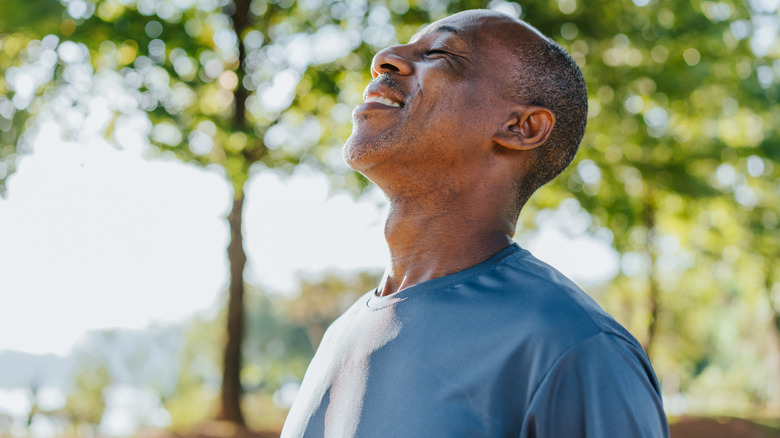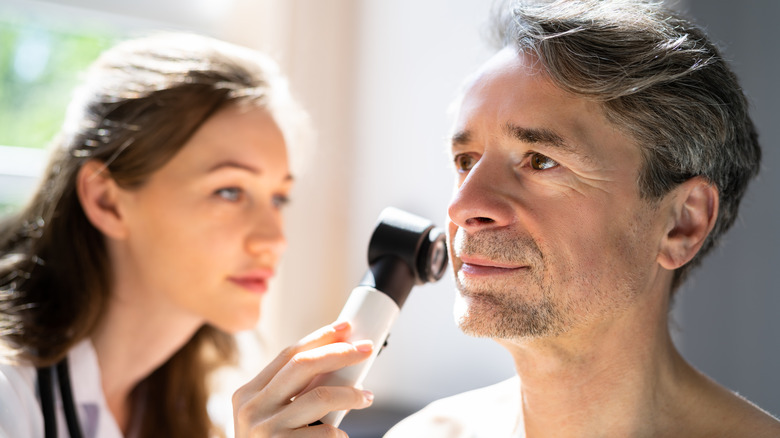Sitting In The Sun Has A Little-Known Effect On Your Prostate
A few minutes spent basking in the glow of the sun's rays may leave us feeling just a little bit happier. According to Medical News Today, a healthy dose of sunshiny vitamin D may help boost mood and alertness, reduce physical pain, enhance feelings of relaxation, and — if you're seated by a window — have you feeling a greater sense of job satisfaction. Though it may not seem directly correlated at first glance, sitting in the sun may also benefit your prostate health.
For men and people assigned male at birth, the prostate contributes to the production of ejaculate and helps move semen through the urethra to then be expelled from the body during orgasm. About as small as a walnut, the gland only weighs approximately 1 ounce, according to the Cleveland Clinic. Small as it may be, though, the prostate is particularly susceptible to cancer, especially in people diagnosed with benign prostatic hyperplasia (BPH), or an enlarged prostate. Johns Hopkins Medicine reports that the condition is known to affect about 1 in every 4 men by the time they turn 55. Here's how sunlight may help reduce one's risk for prostate cancer.
Vitamin D may help reduce the risk of prostate cancer
Regularly getting outside on a sunny day starting in our youth may benefit our prostate health in the long run, according to findings of an early 2007 study published in Cancer Epidemiology, Biomarkers & Prevention. While exposure to sunlight as an adult still had the benefit of lowering prostate cancer death risk, men who got ample sunlight in early life, as well as in adulthood, were less likely to develop prostate cancer in the first place.
Such findings were similar to those in a 2005 large-scale study published in Cancer Research, in which researchers determined that the risk of developing prostate cancer was cut in half for men with greater amounts of sun exposure compared to those who received little sunlight. What's more, for men with certain gene mutations, sun exposure lowered the risk of prostate cancer by 65%. However, this doesn't mean that people with prostates should spend hours baking in the sun. Rather than the UV rays themselves providing the benefit, the researchers point to the production of vitamin D as the protective mechanism, emphasizing that there are plenty of ways to get adequate amounts of vitamin D that don't increase the risk of skin cancer.
However, sun exposure may not be the best way to get it
The decreased risk of prostate cancer and the increased risk of skin cancer, both associated with greater sun exposure, was the subject of study in research published in 2007 in the British Journal of Cancer, where researchers analyzed more than 500 patients with prostate cancer and over 400 men with basal cell carcinoma (skin cancer). The control group was composed of 365 patients with enlarged prostate. The study findings showed that factors, such as childhood sunburning, occasional or frequent sunbathing, as well as weekday and/or weekend sunlight exposure appeared to lower one's risk of prostate cancer. However, childhood sunburning, yearly vacations to a sunny climate, and weekend sunlight exposure were shown to boost one's risk for basal cell carcinoma.
Staying cooped up all day can negatively affect blood pressure and our overall health, so it's important to regularly get outside in the fresh air and sunshine. Instead of sunbathing, however, some experts suggest seeking vitamin D elsewhere. "If future studies continue to show reductions in prostate cancer risk associated with sun exposure, increasing vitamin D intake from diet and supplements may be the safest solution to achieve adequate levels of vitamin D," researchers from the 2005 Cancer Research study told ScienceDaily.



